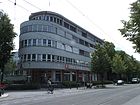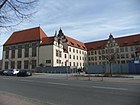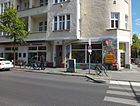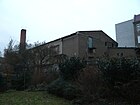List of cinemas in the Lichtenberg district
The list of cinemas in the Lichtenberg district gives an overview of all cinemas that existed or still exist in the Lichtenberg district of Berlin . It includes the districts of Alt-Hohenschönhausen , Falkenberg , Fennpfuhl , Friedrichsfelde , Karlshorst , (Alt-) Lichtenberg , Malchow , Neu-Hohenschönhausen , Rummelsburg and Wartenberg , which have been part of the district since the administrative reform in 2001 . The compilation is based on various sources, including Berlin address and telephone books, daily newspapers, information from the Kino-Wikis.
introduction
The following overview is based on the district boundaries established with the district reform of 2001. The districts of Marzahn, Hellersdorf, Biesdorf, Kaulsdorf and Mahlsdorf, which until 1979 belonged to the Lichtenberg district and now to the Marzahn-Hellersdorf district, are included in the list of cinemas in the Marzahn-Hellersdorf district . Areas of the Friedrichshain district that belonged to Lichtenberg until 1938 can be seen in the list of cinemas in Berlin-Friedrichshain . - In the districts of Falkenberg, Fennpfuhl, Malchow and Wartenberg there were and are no cinema buildings.
In 2016, two initiators launched the Stadtlichter film festival (also known as the 1st International Lichtenberg Film Nights ), supported by the district office . There are film screenings at seven different locations in the district, which have the seven Lichtenberg partner cities as their content. At the end of May 2016 there were films from Hanoi's trendy Hoàn Kiem district in the great hall of the Vi Saalt Phố restaurant in the Dong Xuan Center . In early June toured the film festival in Veranstaltungshaus Heikonaut of Sewanviertels with films from the Polish partner county Hajnówka and Polish animated films ( Bennie and Lennie ) . In mid-June 2016, films about the Lithuanian twin town Jurbarkas were shown in the Kesselhaus Museum of the Queen Elisabeth Herzberge Hospital (including Too Young to Drive and Fellow Travelers ), with the opportunity to discuss with the directors afterwards.
Lichtenberg libraries such as the Bodo-Uhse-Bibliothek (Friedrichsfelde), the Anna-Seghers-Bibliothek (Neu-Hohenschönhausen), the Anton-Saefkow-Bibliothek (Fennpfuhl) and the Egon-Erwin-Kisch-Bibliothek (Lichtenberg) have been showing in a film on selected Saturdays in their premises. The visit is free.
There is currently (as of 2017) a cinema that is constantly being used only in the Neu-Hohenschönhausen district .
Overview
The cinemas are pre-sorted according to the last valid name. They are shown with the current addresses (as of spring 2016).
| Name / location | address | Duration | Description, possibly picture |
|---|---|---|---|
|
Cinemotion
( Location ) |
Neu-Hohenschönhausen, Wartenberger Strasse 174 | since 1998 |
2000 seats in nine cinema halls |
| Elite Theater (1927)
( Location ) |
Lichtenberg, Frankfurter Allee 244–250 | 1921-1929 |
The cinema was operated from 1921 under the name Lichtspiele Wintergarten in a building erected in 1907 as a department store. Cinema screenings took place daily. The facility initially had 160 places, by 1929 it was reduced to 127. There were also changing owners; after 1929 the recording was given up. |
| Emanuel-Lichtspiele (1928), Emig (1917) and other changing names ( Location ) |
Rummelsburg, Emanuelstrasse 5 at the corner of Leopoldstrasse |
1917-1945 | Opened in 1917, the facility was named after the operator Karl Emig. The cinema was named Emanuel-Lichtspiele in 1928. Before that, it was also called Union-Theater , Union-Lichtspiele and after the other access Leopold-Lichtspiele . In 1941 it was briefly the Engelmann after its (new) operator. But in 1943 it was again shown in the address book as Emanuel-Lichtspiele. The number of seats has fluctuated over the years between 140 and 200. A residential building was built on the area after the Second World War . |
| Movie palace
( Location ) |
Rummelsburg, Hauptstrasse 2 | 1931-1934 | In the previously built café Bellevue on the edge of the Rummelsburger See , there was a cinema called Film Palast Lichtenberg for around three years . The restaurant was demolished in 1935, and there was no new development at this point. |
| Gloria Palace (1930); King's ballroom (1910), then several name changes, officers' mess of the Soviet Army (1945), Kreiskulturhaus Lichtenberg (1966), Kulturhaus Karlshorst (1990) ( Location ) |
Karlshorst, Treskowallee 112 (before the renumbering Treskowallee 87) |
1910-2010 |
The cinema was opened in 1910 as the king's ballroom . The three-storey building housed apartments and, since 1917, a movie theater operated by Richard Arnhold with changing names such as Karlshorster Lichtspiele , First Karlshorster Lichtbildtheater , Karlshorster Film and Stage Show . Between 1930 and 1945 it was called the Gloria Palast and the cinema owner was Lothar Borchert. The building complex was used as an officers' mess by the Soviet Army from 1945 to 1966. The structure was probably badly damaged in the last days of the war and was repaired without the small dome and without facade decorations. After the army withdrew, the East Berlin magistrate received the facility back and used it as the Lichtenberg district culture center . From 1990 to 2010 it was the Karlshorst cultural center . Since 2011 the previous building has been replaced by a new complex without a cinema. |
|
Hohenschönhausen plays of light
( Location ) |
Alt-Hohenschönhausen, Werneuchener Strasse 22 | 1943 |
Registered in the Berlin address book in 1943 ; no further indications of the existence of a cinema can be found at this point. |
|
Hohenschönhauser sound and light plays
( Location ) |
Alt-Hohenschönhausen, Konrad-Wolf-Straße 94 (until 1985: Berliner Straße ) | 1933-1943 |
The building on this parcel was built after 1990 as a business and medical center (see picture). The previous house was cleared after being destroyed in World War II . |
| Jahn light plays
( Location ) |
Rummelsburg, Marktstrasse 2/3 | 1954-1964 |
In 1954 the cinema was opened in the auditorium of the former Jahn-Realgymnasium (school name from 1912 to 1938), from which its name was derived. At the opening of the cinema, a daily newspaper said: “The Jahn-Lichtspiele will be the new film theater this Friday with the new DEFA film Kein Hüsung in the XV. Primary school, Lichtenberg, Marktstrasse 2/3, opened. The screenings begin on weekdays at 5:30 pm and 8:00 pm, on Sundays at 3:00 pm, 5:30 pm and 8:00 pm. ”It was closed on June 1, 1964, the last film being shown from May 29 to 31, Three Love Letters from Tyrol . |
| Kammerspiele or (1941) after its operator P. Wünsch Union-Lichtspiele , Kammer-Lichtspiele and Triumph-Lichtspiele from the 1950s again Kammerspiele with the lessee Günther Schmitz ( Location ) |
Rummelsburg, Weitlingstrasse 33 (before 1938 Wilhelmstrasse ) |
around 1940–1962 |
The cinema was closed in March 1962. In the neighboring house was the Weitling-Eck restaurant , which was then renamed Kinoklause to match the cinema . After the political change , a bakery / confectionery was established at Weitlingstrasse 35 and a light house at Weitlingstrasse 33 on the corner of Margarethenstrasse. In November 2009, a bicycle shop moved into the former cinema. |
| Cosmos light games
( Location ) |
Rummelsburg, Lückstrasse 70 | 1928 - after 1943–1945 | After the Second World War , the entire row of houses between Weitlingstrasse and Lückstrasse 73 was destroyed and cleared . At the beginning of the 21st century, the property was still fallow . |
| Mila light games; Liebig Kinotheater (1917), Emig (1918) later Union-Lichtspiele , Stadthaus-Lichtspiele ( Location ) |
Rummelsburg, Stadthausstrasse 5 | 1917-1941 | It was opened as Liebig's cinema theater in 1917, and the house has always been given new names due to several changes of ownership. The wing of the building with number 5 was destroyed in the Second World War and not rebuilt. |
| Park light games
( Location ) |
Lichtenberg, Parkaue 25 | 1946-1948 |
The cinema offered 493 seats. The school house in which the cinema was located became the children's house in 1949 and the central house of the young pioneers in 1950 (1961 to 1990 the central house of the young pioneers 'German Titow' ). |
|
Reform Theater , also named Leuschner after its owner
( Location ) |
Alt-Hohenschönhausen, Konrad-Wolf-Strasse 76 (until 1985 Berliner Strasse ) |
1911 - after 1945 |
The 1921 address book contains the entry Cinematographic Demonstrations at the address Berliner Straße 76 with the name Reform-Theater und Leuschner, M. The corresponding building complex is a corner house on the (later) Sandinostraße. A distinction was made between portals; M. Leuschner , cinema owner, lived in Portal II . In 1930 the owner of the cinema was W. Redell. How long the movie theater existed is not known. The building was not damaged in the war. |
| Ringbahn Theater | Lichtenberg, Frankfurter Allee 115/117 (from 1954 to 1961 Stalinallee 401 )
( Location ) |
1949-1960 | The cinema, also known as the Lichtenberger Ringbahntheater, was located on the north side of Frankfurter Allee, directly on the east side of the Ringbahntheater, and had 354 seats (initial numbering 269). The demonstrations took place daily. After the building was removed in 1960, there was only an unkempt green space here until after 1990. The Ring-Center II was only built on this site around 1997, but there is no cinema in it. |
| Rio plays of light | Lichtenberg, Möllendorffstrasse 14
( Location ) |
around 1920 – after 1943 | The building wing was damaged at the end of the Second World War and then removed. In its place, a purely residential row was created in the 1970s. |
| Castle lights (1928)
( Location ) |
Friedrichsfelde, Einbecker Straße 119 (until 1950: Wilhelmstraße 17a) | 1928-1980 |
The single-storey building with a pent roof was built in 1928 for the expanding community of Friedrichsfelde. The southern long side of the projection room stood along Einbecker Strasse. The auditorium was sloping downwards and a screen provided with a glitter curtain was drawn up (in the 1960s) for the cinema performances with a melodic triad. In 1980, the Lichtenberg administration had the cinema closed because it was in disrepair; the house was demolished in 2009. |
| Black Eagle | Lichtenberg, Frankfurter Allee 124–120 (southern side; on the corner of Gürtelstraße)
( Location ) |
1914-1949 | The Schwarzer Adler office building at Frankfurter Allee 99 had a ballroom , in which the owner Richard Arnhold opened a cinematograph projection room in 1914 . In 1929 a new owner had the cinema room expanded to 500 seats and named it the Schwarzer Adler cinema . The building was badly damaged at the end of the Second World War and then demolished, the area leveled after 1949. The new residential area Frankfurter Allee Süd (FAS) was built at this point during the GDR era . |
| Toni light plays
( Location ) |
Lichtenberg, Normannenstrasse 14 | –Early 1950s | |
|
Venus (1966); Uhu (around 1950), later Uhu Filmbühne ( Location ) |
Alt-Hohenschönhausen, Degnerstrasse 9 | around 1950–2003 |
The former tram depot was repaired after being destroyed in the Second World War and converted into a cinema. It opened its gaming operations in 1947 with 586 seats. The cinema was rebuilt and modernized several times, after 1990 it was also re- privatized , but had to be closed in 2004 for economic reasons. So far (as of July 2016) there has been no new use for the house. |
| Volkshaus (1946) Busch (1928) ( Location ) |
Lichtenberg, Alt-Friedrichsfelde 3 (1976–1992 Street of Liberation ) | 1928-1992 |
The film theater opened as Kino Busch in 1928 , operated by A. and E. Busch. It was named Volkshaus in 1946. The cinema was closed in 1992. Gutting took place in 2009 , after which the remains of the building were removed. An apartment building has been built on the area since 2016. |
| Forward (1951) Capitol (around 1920) ( Location ) |
Karlshorst, Treskowallee 96, house number 115 since 1961 | around 1920–1990 |
The cinema, an unadorned, gray plastered individual building in the immediate vicinity of Karlshorst train station , was called the Capitol until 1951 . It served as a troop cinema for the Soviet Army in 1948/1949 . In August 1951 it was renamed Forward . In April 1990 the cinema was closed. The building complex, in which the Café Vorwärts was also located, was demolished in 2001. The area will be rebuilt with an apartment house (Johann-Christian-Ludwig-Hellwig-Haus) by 2017. |
Web links
- Jutta Arnold: www.luise-berlin.de: On the trail of cinemas - All cinemas on the computer (interview).
Individual evidence
- ↑ Kino-Wiki website accessed on April 18, 2016
- ^ Berlin film festivals. Questions for Berit petzsch and Juliane Springsgurt , accessed on August 22, 2017.
- ↑ BVV Lichtenberg press release from May 26, 2016: First Berlin film festival on city partnerships: “City lights” celebrate their premiere in the Don Xuan Center .
- ↑ www.stadtlichter.berlin; Retrieved June 7, 2016.
- ↑ Homepage of the Lichtenberg libraries with event preview under “Film from”, accessed on August 10, 2016.
- ↑ Elite theater on KinoWiki
- ↑ a b c Sectors> Movie theater . In: Berliner Adreßbuch , 1941, II, p. 355.
- ↑ a b c d e List of cinemas in Berlin 1943 cinemas (in alphabetical order) . In: Berliner Adreßbuch , 1943, II, pp. 430–431.
- ↑ Treskowallee 87 . In: Berliner Adreßbuch , 1912, V, p. 253.
- ↑ Cinematographic performances> Treskowallee 87 . In: Berliner Adreßbuch , 1921, V, Vororte, p. 71.
- ↑ a b c d e f Official telephone book 1941
- ^ History of the Friedrich List School , accessed on August 22, 2017.
- ^ Short message from the daily newspaper Neues Deutschland from May 14, 1954, p. 6.
- ^ Berliner Zeitung , weekly schedule preview on June 1, 1964; P. 10.
- ^ Fernsprechbuch Berlin (East) edition 1957/58, all cinemas
- ↑ What is my cinema playing? . In: Berliner Zeitung , March 30, 1962, p. 10.
- ^ Business telephone directory 1957: Weitling-Eck, Weitlingstrasse 35
- ↑ industry Fernsprechbuch 1961: Cinema Klause
- ↑ Street view of the house at Weitlingstrasse 33 , accessed on July 19, 2016.
- ↑ Bicycle shop homepage , accessed on July 20, 2016.
- ↑ a b c d e KinoWiki 1931 ( Memento from April 27, 2016 in the Internet Archive )
- ↑ Cinematographic presentations> Emig, K.> Stadthausstraße 5 . In: Berliner Adreßbuch , 1918, V, p. 136.
- ↑ a b KinoWiki 1949 ( Memento from April 27, 2016 in the Internet Archive )
- ^ Suburbs> Berlin-Hohenschönhausen> cinematographic ideas . In: Berliner Adreßbuch , 1921, V, p. 85.
- ^ Hohenschönhausen> Berliner Strasse 76 . In: Berliner Adreßbuch , 1922, V, p. 1759.
- ^ Hohenschönhausen> Berliner Straße 76> Portals . In: Berliner Adreßbuch , 1930, IV, p. 2099 (see Portal II).
- ↑ KinoWiki> Ringbahn-Theater
- ^ Berlin telephone directory 1941> Lichtspieltheater
- ↑ Kino Schwarzer Adler on KinoWiki
- ^ Postcard from the Schwarzer Adler Inn on Frankfurter Allee around 1920
- ^ Toni-Lichtspiele in: Business directory for Berlin 1951, p. 274
- ↑ "The theater in Alt-Friedrichsfelde has received a pleasant boost in its neat new look and name as 'Volkshaus Lichtenberg'." In: Berliner Zeitung , September 4, 1946, p. 5.
- ↑ Troop cinemas on filmtheater.square7.ch
- ^ In the Berliner Zeitung of July 13, 1951, it was stated on page 5 that the Capitol would be closed from July 16 for renovation. The August 4, 1951 edition, on the other hand, announced film events in Vorwärts on page 6 of the World Festival .
- ↑ Cinema program from April 13 to 19, 1990 . In: Berliner Zeitung , April 12, 1990, p. 13.
- ^ Website of GBI AG Erlangen












